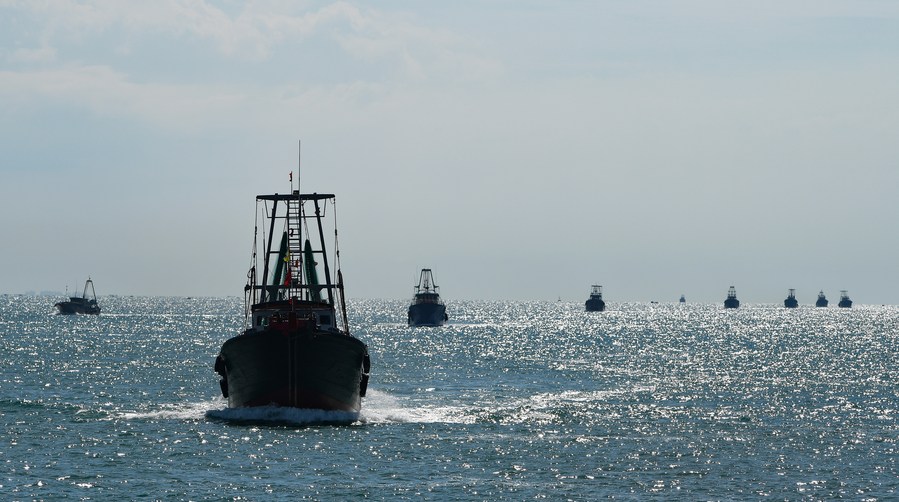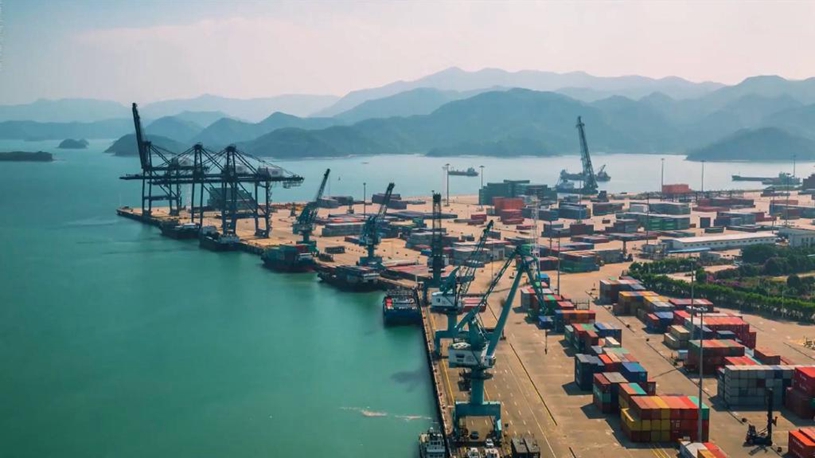
Fishing boats sail across the Qiongzhou Strait as the summer fishing moratorium ended in the South China Sea, Aug. 16, 2021. (Xinhua/Yang Guanyu)
Washington's frequent muscle-flexing in the South China Sea is a clear proof of its intention to provoke confrontation and undermine cooperation in the region.
BEIJING, Jan. 17 (Xinhua) -- Despite the overall stability in the South China Sea, the United States has once again played its old ploy of sowing discord in the region.
The U.S. Department of State on Wednesday released a so-called study, saying China's claims in the South China Sea are "unlawful," a statement that completely misrepresents international law and runs counter to the historical facts of the South China Sea issue.
The activities of the Chinese people in the South China Sea date back to over 2,000 years ago. China is the first to have discovered, named, and explored Nanhai Zhudao and relevant waters, and the first to have exercised sovereignty and jurisdiction over them continuously, peacefully and effectively.
China's sovereignty over Nanhai Zhudao and relevant rights and interests in the South China Sea have been established in the long course of history, and are solidly grounded in history and law. China's sovereignty over Nanhai Zhudao has been widely acknowledged by the international community.
The encyclopedias, yearbooks and maps published in many countries mark Nansha Qundao as belonging to China.

Aerial photo taken on July 13, 2020 shows an expedition vessel in the South China Sea. (Xinhua/Zhang Liyun)
However, for the sake of its hegemonic interests, the United States has ignored all these facts and distorted China's legitimate actions as so-called "violations of international law."
Despite using the cloak of upholding "international law," the United States' ulterior motives can be easily seen through. Washington's frequent muscle-flexing in the South China Sea is a clear proof of its intention to provoke confrontation and undermine cooperation in the region.
The large-scale military surveillance conducted by U.S. aircraft and the nuclear submarine collision incident that the Pentagon has deliberately covered up have distinctly showed the world who is the true trouble-maker in the South China Sea.
Moreover, it is ridiculous that the United States, widely recognized as the world's biggest rule-breaker, has cited international law to point fingers at others.
The United States has been well-known for cherry-picking when it comes to international rules that best serve its own political and economic gains, especially in recent years when the country has been addicted to scrapping international treaties and withdrawing from international organizations.

Photo taken on July 30, 2020 shows the Kantan No.3 offshore oil platform in the northern waters of the South China Sea. (Xinhua/Pu Xiaoxu)
In sharp contrast to the discredited superpower, China has always been a staunch promise-keeper. As a party to the United Nations Convention on the Law of the Sea (UNCLOS), China has all along worked with the Association of Southeast Asian Nations (ASEAN) countries to properly handle the South China Sea issue on the basis of mutual respect and in accordance with international laws including UNCLOS and in light of the regional realities.
Ironically, while styling itself as a judge, the United States refuses to join the convention. It wantonly misrepresents the convention and adopts double standards. Such political manipulation is irresponsible and undermines the international rule of law.
At present, with the joint efforts of China and ASEAN countries, the situation in the South China Sea is generally stable. China and ASEAN countries are fully and effectively implementing the Declaration on the Conduct of Parties in the South China Sea and actively promoting consultations on the Code of Conduct in the South China Sea.
If Washington really cares about peace and stability in the South China Sea, it should respect international law and historical facts, and stop stirring up trouble in the region. ■












